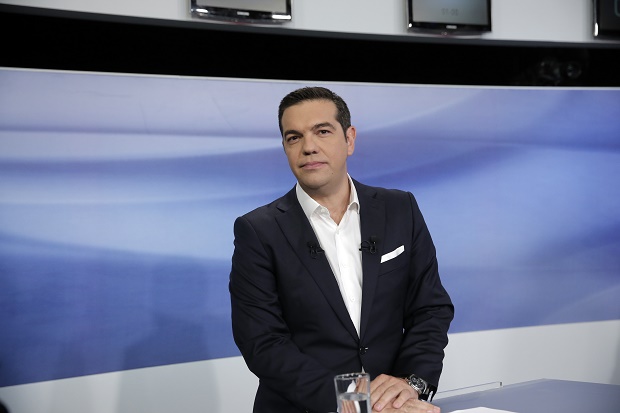
Former Greek Prime Minister Alexis Tsipras, and the leader of the left-wing Syriza party waits prior to a live televised debate with main opposition conservative New Democracy head Vangelis Meimarakis, not seen, at the state-run ERT television in Athens, Monday, Sept. 14, 2015. Greece is holding a snap general election on Sept. 20, 2015. AP Photo
ATHENS, Greece—Alexis Tsipras, the former Greek prime minister and leader of the far-left Syriza party is confident he can regain power at this weekend’s parliamentary elections.
“Syriza will certainly be the biggest political party in the country and I think the goal of an absolute majority is totally achievable,” Tsipras told the Euronews television channel Tuesday.
According to the latest opinion polls, Syriza has a wafer-thin lead over its main rivals, the New Democracy conservatives.
The polls suggest there will be no outright Syriza majority.
Greeks will go to the polls for the fifth time in six years on Sunday as Tsipras seeks a fresh mandate to push through huge reform commitments made under a new 86-billion-euro ($96 billion) bailout with the country’s international creditors.
READ: Greek election could result in new, big coalition government
Tsipras, who stood down last month amid criticism of his handling of Greece’s economic crisis, said he was prepared to consider forming a coalition government with other parties in order to avert another round of elections.
“If we do not obtain a majority, we will have our program, our plan and there will be other parties whose deputies do not want to risk new elections,” he said.
At the last elections in January, Syriza won with 36.3 percent of the popular vote, well ahead of the 27.8 percent secured by their right-wing rivals.
The left-wing party came to power promising an end to the policies of austerity agreed by their predecessors in return for international bailouts.
But after six months of negotiations with its creditors, the European Union and the International Monetary Fund, it was forced in July to agree to more austerity measures in exchange for another multi-billion-euro loan.
READ: Greece’s Tsipras resigns, calls snap polls to beat party revolt
That agreement triggered the fall of Tsipras and his Syriza government.
The former prime minister told Euronews that his party had proved it could rule Greece “to keep the country in Europe and avoid another, even more serious economic catastrophe.”
In previous media interviews, Tsipras ruled out cooperating with the right but left the door open to working with the socialist Pasok party.